July 7, 2025 – Walk at Namsan Mountain in Gyeongju, Community Dharma Teachers’ Gathering
Hello. The sun rose over at Dubuk Jungto Retreat Center. Today, Sunim spent the entire day with the community Dharma teachers after a long time.
After completing his morning practice and meditation, Sunim left Dubuk Jungto Retreat Center at 5:30 AM and headed to Namsan Mountain in Gyeongju. While traveling by car, the morning sun rose brightly over Namsan Mountain in Gyeongju.
When Sunim got out of the car, the Dharma teachers had just arrived at Gyeongju’s Namsan Mountain. Six Dharma teachers had driven from Seoul to Gyeongju. After exchanging warm greetings, they began their walk together.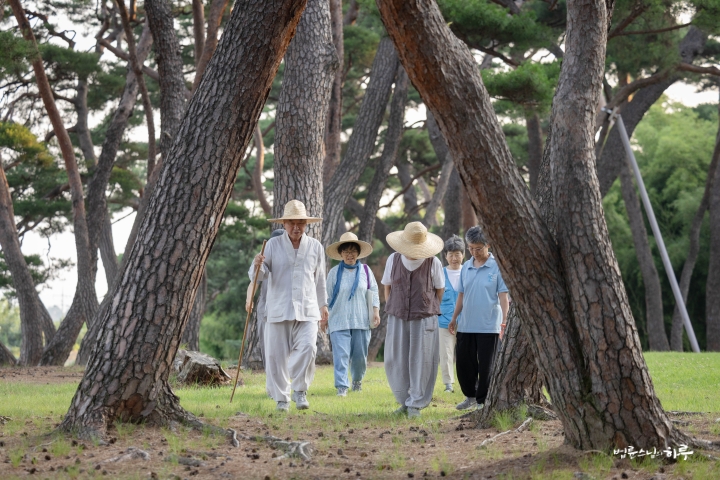
“You’ve all worked so hard caring for Dharma Teacher Myohyang. Today, let’s take a walk at Gyeongju’s Namsan Mountain, eat something delicious, and take a day to rest.”
Until last week when Dharma Teacher Myohyang passed away, the community Dharma teachers had been taking turns providing care for nearly two years. Sunim expressed special gratitude to the Dharma teachers who had worked so hard in caregiving.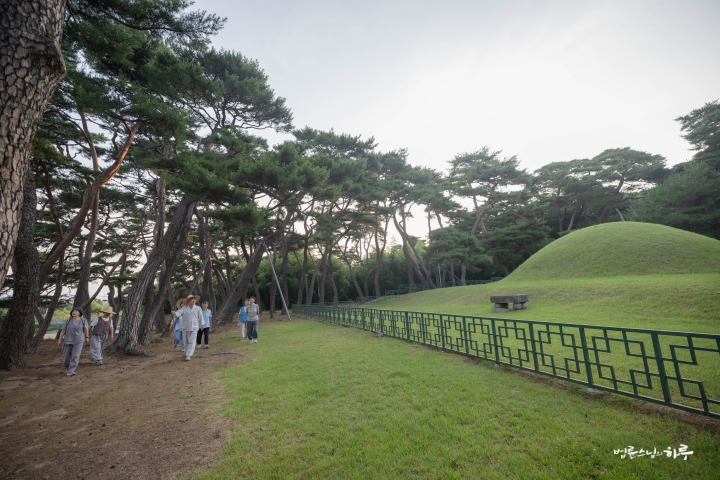
Starting from Poseokjeong, they passed by the Tomb of King Jima. Sunim said with a smile.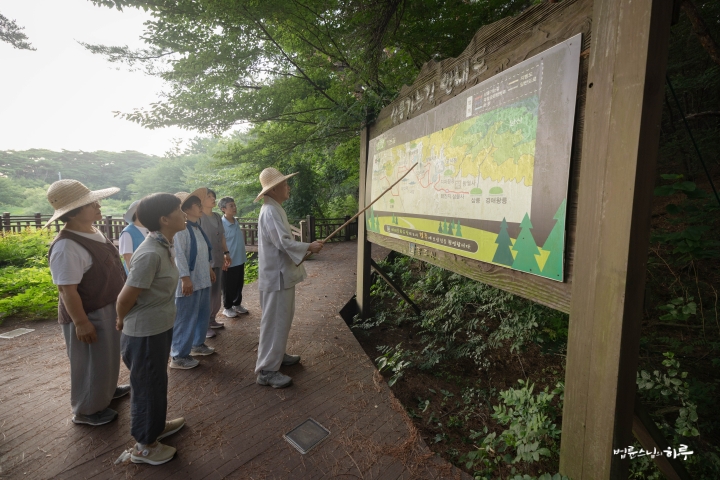
“This path is on the western slope of Gyeongju’s Namsan Mountain. If you walk this path in the morning, you can walk in the shade.”
They strolled along the western slope, staying in the shade.
By the pond, the grass stood as tall as a person, swaying like waves in the wind.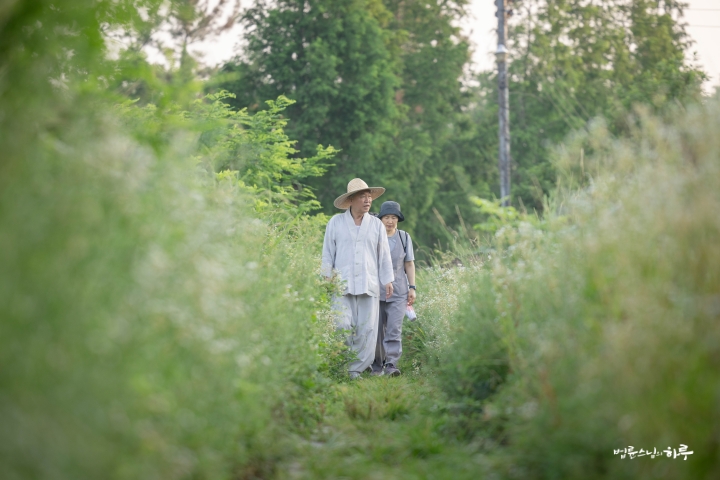
After passing Sambulsa Temple, they reached the entrance to Samneung Valley.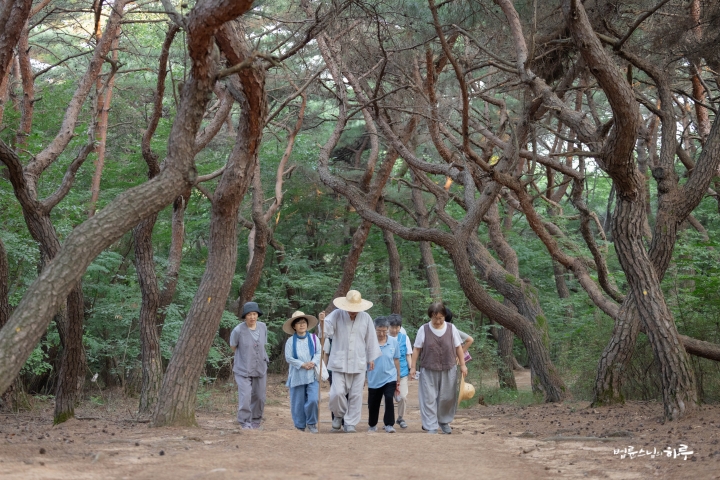
They sat on a wide rock to cool off for a moment.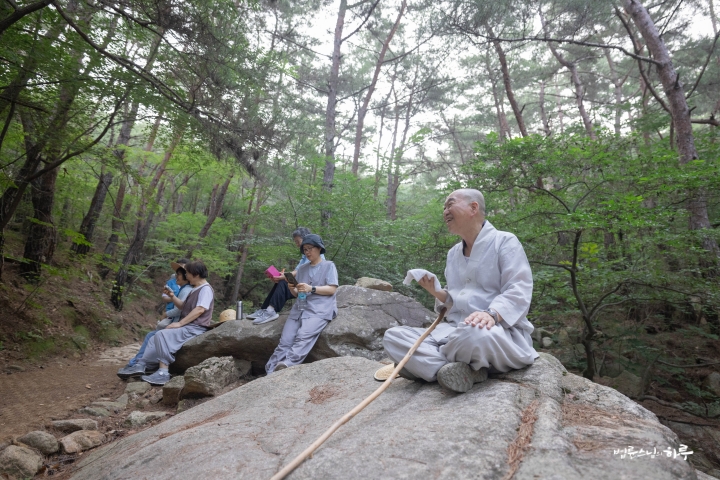
“Now I can’t go uphill anymore, I can only walk on flat ground.”
In the past, Sunim would have climbed up Samneung Valley and descended through Yongjang Valley, but today he only walked the trail at a leisurely pace.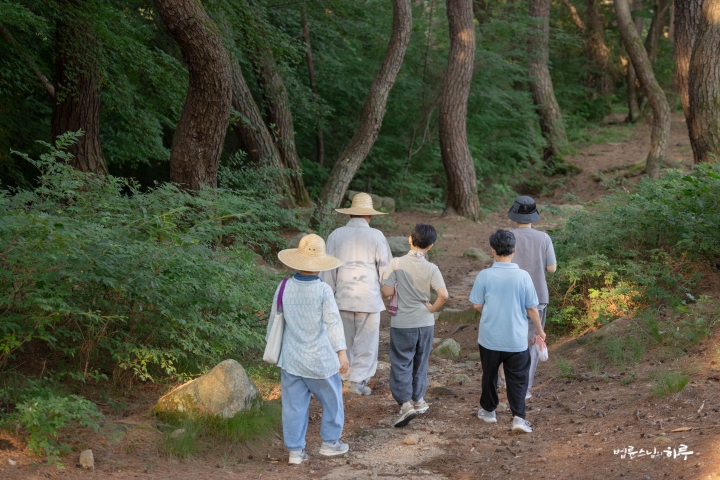
After walking past Samneung to King Gyeongae’s Tomb, they finished their walk.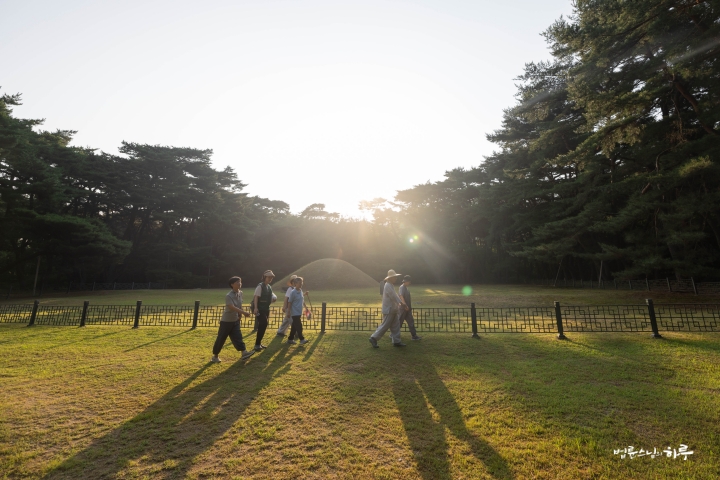
They got back in the car and headed to Dubuk Jungto Retreat Center.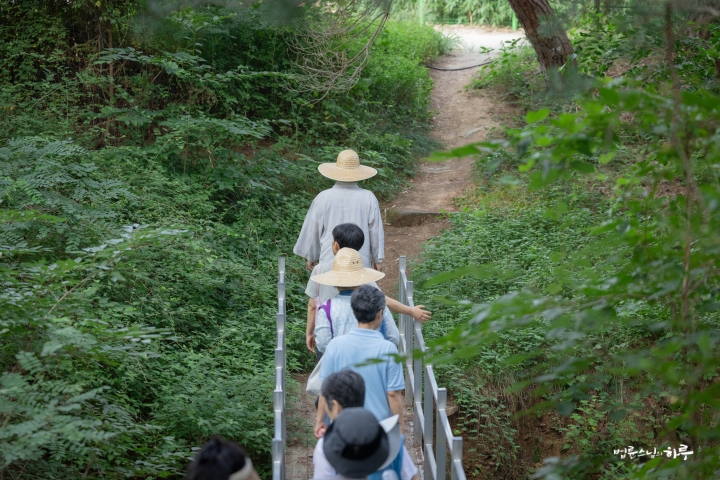
Ten Dharma teachers from Mungyeong Jungto Retreat Center also drove to Dubuk Jungto Retreat Center. Almost all the community Dharma teachers gathered, except for a few who were in retreat or on sick leave.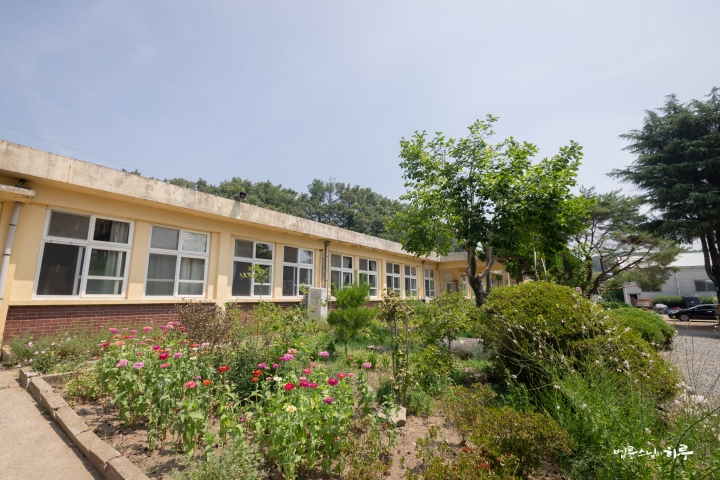
First, Sunim explained the reason for today’s gathering.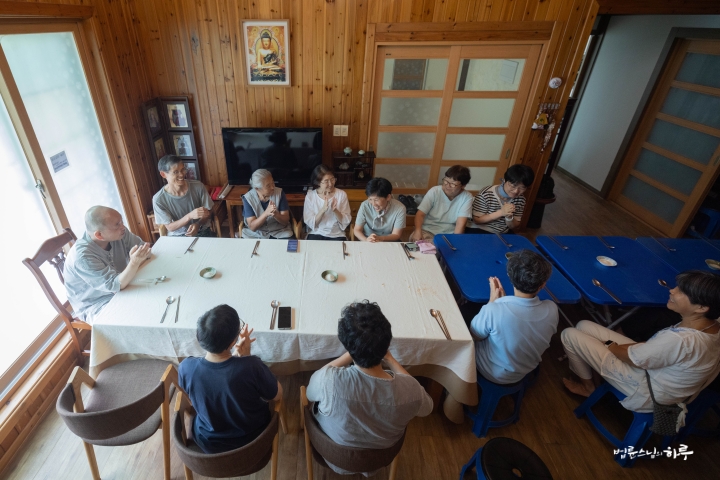
“I asked everyone to come today to offer encouragement because the Dharma teachers have worked so hard caring for Dharma Teacher Myohyang and Dharma Teacher Hyangdeok for the past two years. Everyone worked hard, but who particularly had the most difficult time?”
“Dharma Teacher Hyanggwangmyeong. In the early days, Dharma Teacher Myosu helped a lot.”
Everyone applauded and encouraged one another.
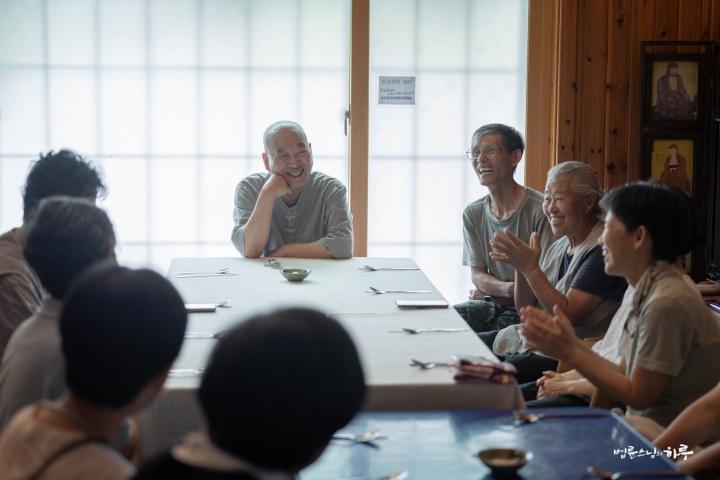
Dharma Teacher Hyangdeok, who was seriously injured in a traffic accident two years ago and is undergoing rehabilitation treatment, also attended the gathering. Sunim smiled at Dharma Teacher Hyangdeok and said,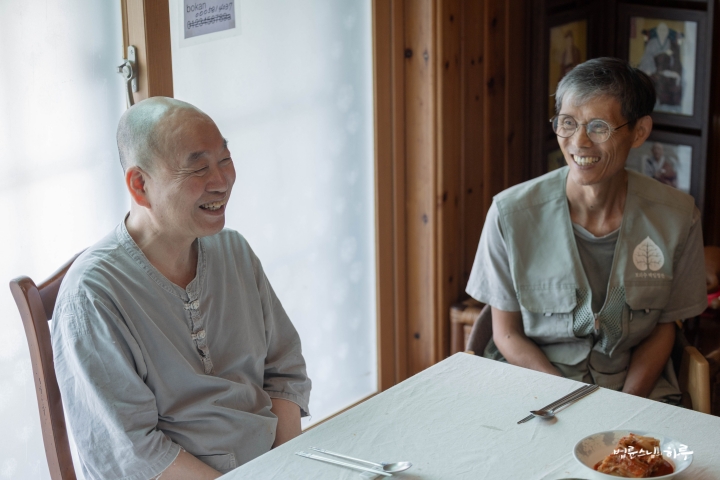
“The other Dharma teachers worked hard providing care, and Dharma Teacher Hyangdeok worked hard being sick.” (Laughter)
Dharma Teacher Hyangdeok also answered with a smile.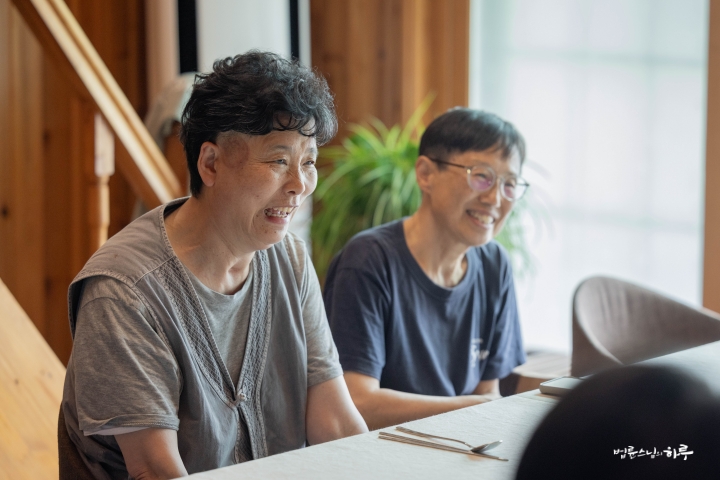
“Yes, that’s right.”
After discussing where to go for this year’s Dubuk elders’ autumn outing, everyone had lunch together. Lay practitioner Choi Mal-soon had carefully prepared food for the Dharma teachers.
In the afternoon, they worked indoors to avoid the hot sun. With the temperature rising to 34 degrees Celsius, they were sweating even while sitting still.
As the sun set, the heat eased and a cool breeze drifted in.
After having dinner together, they departed from Dubuk Jungto Retreat Center at 9 PM and headed to Seoul.
After a four-hour drive, they arrived at Seoul Jungto Center at 1 AM and concluded the day’s activities.
Starting tomorrow, the Asia lecture tour begins. In the morning, Sunim will meet the JTS Secretary General to prepare for the 32nd anniversary seminar, and in the afternoon, he will take a flight from Incheon Airport to Singapore.
Since there was no Dharma talk today, I’ll conclude by sharing a conversation between a questioner and Sunim from the Dharma Q&A held at Jungto Social and Cultural Center on the 27th of last month.
My Parents Oppose My Marriage Because of Bad Fortune-Telling
“Do your parents have quite a bit of wealth?”
“Yes.”
“Then there’s something to gain from them. If you think you might receive some property on the occasion of marriage with your parents’ approval, you need to consider which is better: what you’ll earn working for the next few years or what you might get by persuading your parents well. But if you’re firmly decided to live on your own without depending on your parents, while it would be nice to have their approval, it wouldn’t matter if you don’t get it, would it?
Legally and ethically, anyone over 19 years old can marry without parental consent. Even becoming a monk requires no parental consent if you’re over 19. This is because adults have the right to decide their own lives. However, minors under 19 cannot decide their lives entirely on their own. They have guardians. The guardian could be parents or someone else. In this case, you must have the guardian’s approval. But since you’re over thirty, you don’t need parental approval. It’s fortunate if you tell your parents and they agree, but it doesn’t matter if they oppose. However, if there are interests at stake like property or inheritance, you need to judge which choice is more beneficial for you.
Fortune-telling has plausible grounds for those who believe in it, and no grounds at all for those who don’t. If you want to get married, just don’t believe in fortune-telling. If you don’t want to get married, use it as an excuse. Your parents are using fortune-telling as an excuse because they oppose the marriage. In the old days, once you married, you couldn’t marry again. People married without seeing faces or dating – they married complete strangers. So the risk was very high, and you couldn’t return someone just because they turned out bad after living together. To reduce this risk even a little, people checked fortune-telling to see if they were compatible. This psychological safety device was necessary in that era. But now, you see faces directly, date for years, and even live together, so fortune-telling isn’t really necessary. Ultimately, it’s your choice. If there’s something to gain from parental approval, it’s beneficial to wait and persuade them. If they oppose to the end, just make your own decision.
And when your parents say ‘I won’t let your boyfriend get away with this,’ think of it this way. When we drive cars, there’s always a risk of accidents, right? Will you not drive at all because there’s even a little risk? Realistically, even though there’s accident risk, we drive because the probability is very low. Then what’s the probability of parents harming their children? That’s also very low. So you don’t need to worry too much.”
“All my worries have been resolved. But I recently read Sunim’s book ‘Sunim’s Wedding Officiation,’ where you mentioned that doing a 100-day prayer would be good. I’m curious about what kind of prayer method would be good.”
“If you were really determined to get married, you wouldn’t have asked me, right? Same if you’d decided not to marry. Asking like this means you haven’t completely made up your mind yet. You’re continuing to have internal conflict thinking ‘Should I get married or not?’ In such cases, it’s good to let go of these worries and do a 100-day prayer. As you pray, a conclusion will naturally emerge. The man might change his mind first and leave, or your parents might oppose so desperately that you absolutely can’t proceed with the marriage. Or your mind might change during prayer, or conversely, you might become determined to ‘marry even if the sky falls.’ If you wait at a distance like this, at some point things will sort themselves out naturally. In the old days, people would say ‘God ordained it’ or ‘It was decided by fate,’ but actually it’s the result of your mind being organized. If you’ve already decided to marry, you don’t need to pray, but if you’re hesitating a bit, let go of the marriage issue and pray. If you pray with the mind of ‘I’ll just live according to my karma,’ the worries and fears in your unconscious will naturally organize themselves and a decision will emerge.”
“Yes, I’ll look into my mind while praying. Additionally, I’d like to ask – my parents say they’ll cut ties with me, but I actually have no problem living on my own and I’m determined to marry my boyfriend. But my parents don’t know how to use taxi apps or online shopping, so I’m worried I won’t be able to help them if they cut ties with me.”
“To put it nicely, you’re a good daughter; to put it badly, you’re foolish. They’re being harsh saying they’ll cut ties, but you’re worrying about whether your parents can take taxis. When your parents are being that forceful, what does it matter whether they take taxis or not? You don’t need to worry about that.” (Laughter)
“Thank you, Sunim.”





